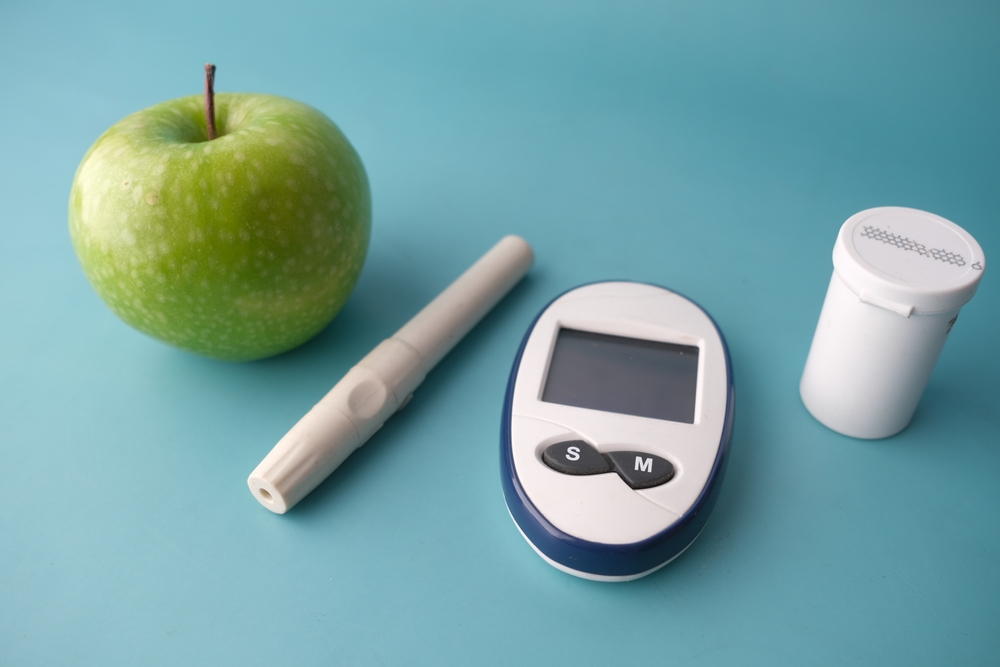
Apples contain antioxidative compounds, fiber, and Vitamins which can reduce the risk of diabetes. Their fiber content helps slow digestion and their fructose content has a relatively small effect on blood sugar levels. While apples have a high glycemic load, they are a good source of fiber and can be paired with healthy fats for balanced blood sugar levels.
Table of Contents
Antioxidants in apples reduce the risk of diabetes

Apples are high in antioxidants, or polyphenols, which help the body fight harmful chemical reactions. They can also reduce the risk of diabetes, especially type 2 diabetes. Antioxidants in apples are particularly beneficial because they can help the body maintain stable blood sugar levels. The highest concentrations of antioxidants are found in red and honeycrisp apples. They contain phlorizin and quercetin, which slow the absorption of sugar and carbohydrate.
The antioxidants found in apples make them the perfect snack for people with diabetes. You can eat them raw or bake them for dessert. They can also be blended with peanut butter or cheese to make a delicious smoothie. Apples are also a wonderful way to boost your vitamin and mineral intake.
Apples contain a moderate amount of carbohydrates and do not spike blood sugar levels. They also contain fiber, which can lower insulin resistance. Additionally, apples are rich in phytochemicals, which are compounds found in many plants. These include flavonoids, proanthocyanidins, and procyanidins. These compounds have the potential to prevent diabetes and heart disease.
Studies have shown that eating fruit regularly can help you preserve your bone density. The antioxidants in apples and other fruits may prevent brittle bones and help keep bone mass intact as you age. The Dietary Guidelines for Americans recommend consuming between 25 grams of fiber daily for women and 38 grams for men. Studies have shown that soluble fiber may help diabetes patients control blood sugar levels.
Antioxidants in apples have been linked to a reduction in the risk of diabetes in mice. The compounds quercetin and phlorizin are the most important antioxidants in apples. These compounds are found in high concentrations in apples and help to maintain their optimum health. In addition, apples also contain a large amount of phytosterols and sterols.
Fiber in apples slows digestion

Researchers believe the fiber in apples can help people with diabetes control their blood sugar levels and prevent the onset of type 2 diabetes. They believe that the fiber in apples helps slow the digestion and absorption of carbohydrates. In addition to being a good source of antioxidants, apples contain other nutrients that can help keep blood sugar levels steady. Apples have a low GI (glycemic index) rating and are high in fiber.
Adding fiber to your diet should be done gradually. Make sure to drink plenty of water, as fiber can be difficult to pass through your digestive system without a lot of water. You should also consult your healthcare provider before making any dietary changes. Including apple slices into your daily diet may be a great idea, but you should be cautious of the potential side effects of too much fiber. In some cases, people may experience gas or bloating if they consume too much fiber.
People with diabetes need to monitor their carbohydrate intake, and an apple has about 25 grams of carbs. A medium-sized apple contains 4 grams of dietary fiber, which may help slow digestion and prevent spikes in blood sugar and insulin levels. This is good news for people with diabetes who want to eat healthy foods.
A healthy diet should include high-fiber foods. Fiber slows the digestive process, allowing the body time to absorb nutrients. It also helps people feel fuller for longer, reducing sugar cravings.
Fructose in apples has little effect on blood sugar levels

The main carbohydrate in apples is fructose. It is absorbed slowly in the intestines but quickly in the liver, where it undergoes a different metabolic pathway than glucose. Apples do have a small amount of glucose, but it is not nearly as much as those found in bananas and sweet grapes. Although apples are a healthy choice for people with diabetes, you should use caution when eating them.
The fructose content of apples is similar to the carbohydrate content in pears and bananas. But, the fiber and polyphenols found in apples helps to slow the absorption of sugar and prevents a sudden spike in blood sugar. These compounds are also known to decrease the risk of cardiovascular disease and type 2 diabetes. A medium-sized apple contains about 19 grams of sugar and 25 grams of carbohydrate, which is not much compared to processed foods.
Apples contain a high content of vitamin C, antioxidants, and fibre. They also contain low levels of glycemic index and glycemic load. These characteristics are important for people with diabetes because they help stabilize blood sugar levels. Moreover, they help reduce insulin resistance in people with type 2 diabetes, a condition that occurs when the body cannot produce enough insulin. By eating apples regularly, you can improve the sensitivity of the cells to insulin and prevent diabetes.
Studies have shown that eating one apple daily is good for the body. Apples are rich in pectin, which is a soluble dietary fiber that is not digested by the human digestive enzymes. Pectin helps to moderate the absorption of glucose and cholesterol. This may also prevent overeating and reduce the chance of craving sugar.
Vitamins in apples help maintain a healthy functioning body

The vitamins and fiber found in apples can help maintain a healthy functioning body. The apple's skin also contains beneficial fiber. This insoluble fiber, which does not absorb water, helps the body to move food through the digestive system. The fruit also has a high level of vitamin C, which is important for the immune system. In addition to helping the body fight infections, vitamin C also helps boost the production of collagen.
In one study, researchers found that apple peels contain strong antioxidant activity. They found that apple peels inhibited the growth of colon and liver cancer cells. The antioxidant activity of one hundred grams of apples is the equivalent to over 1500 mg of vitamin C. While apple skin contains very little vitamin C itself, the apple's antioxidant activity is a result of a combination of compounds found in the fruit.
Research indicates that eating apples is beneficial for people with diabetes and heart disease. They may also protect against cancer. However, apples may be problematic for people with irritable bowel syndrome, since they contain fructose, which may cause digestive issues. However, they are also beneficial for people with high blood pressure and high blood cholesterol.
Apples contain high levels of polyphenols and flavones, which are powerful antioxidants. Studies have also shown that apples may decrease the risk of heart disease and stroke. Researchers believe that this is a result of the high fiber content of apples. Additionally, apple consumption is linked with a decreased risk of Type 2 diabetes, which can lead to cardiovascular disease.
Apples are also excellent sources of fiber and vitamin C. They help lower cholesterol levels, help lower blood pressure, and protect the bones. They also contain antioxidants, which prevent free radicals from damaging the body's cells. These antioxidants can even help protect the digestive system and the immune system.
Type 2 diabetes and apples

Apples contain a lot of antioxidants, which can reduce your risk of developing type 2 diabetes. These compounds inhibit oxidation and protect your cells from free radicals, which damage your cells. Apples are also an excellent source of fiber and water. The nutrients in apples are also very rich in vitamin C, which helps your body fight inflammation and supports a healthy immune system. The polyphenols found in apples are also beneficial to your body and can help your blood glucose levels.
Several studies have also shown that apples can help prevent the development of type 2 diabetes. Researchers from the University of California, San Francisco, and the University of California, Berkeley, found that apple consumption was associated with a lower risk of developing type 2 diabetes. Compared to people who don't have diabetes, apple consumption significantly reduced their risk of developing the disease. In addition, apples contain fiber and antioxidants, which can help stabilize blood glucose levels.
According to the National Institute of Medicine, apples contain about 4.5 grams of fiber, which helps lower blood sugar levels. Diabetics should aim to consume 25 grams of fiber per day, while people without diabetes should aim for 38 grams. This type of fiber is called soluble fiber. Soluble fiber has specific benefits for people with diabetes, as it slows the absorption of sugar into the bloodstream. In addition to apples, soluble fiber is also found in other foods such as broccoli and flaxseed.
Researchers have found that the consumption of apples and pears may reduce the risk of developing Type 2 diabetes by up to 18 percent. However, these results are controversial. While apples may help with insulin levels, they shouldn't be consumed in large quantities or frequently.










